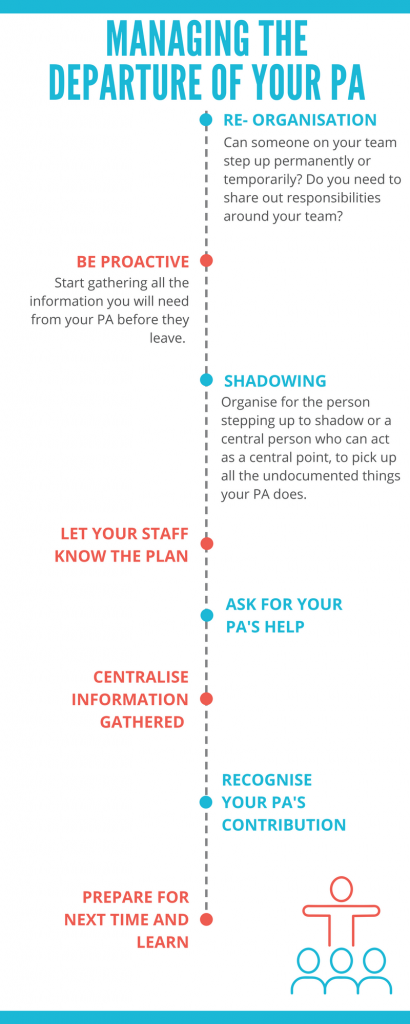The right transition plan between employees ensures a smooth transition. Share on XYour Personal Assistant handing in their notice can feel life shattering. You have a great working relationship and your PA makes your life run smoothly. So now is the time to jump into action. Do you know how to manage your Personal Assistant’s departure
Whether you already have a plan or not. there are still things you can do to ease the transition and there are some relatively simple things you can do to which we will look at in more detail. Remember you have been given notice so it is up to you to use that time wisely.
So how do you manage your Personal Assistant’s departure?
Be Proactive
Once you have an idea of how you can cover the position temporarily or permanently you really need to be proactive in gathering all the information for your new PA or those covering the role will need in the future. Your existing PA should want to help with this. A note of caution – it can be tempting to continue to add to your PA’s workload by asking them to document lots of things for the future. Or to complete projects before they leave. You want them to leave on a high note. So try to find a solution which gives everyone the information they need. Without causing ill-feeling or resentment.
The last few weeks are your golden opportunity to manage the change for all involved. And this includes the rest of the team working alongside your PA. Change can be difficult and stressful for the whole team. And managing it correctly is crucial.
Re-organisation
Is there someone already on your own staff who could step up and take over from your PA? Is there an obvious person? Perhaps someone who covers for your PA when they are on holiday. They will likely know a lot of the tasks your PA does for you and will already have some experience to develop quickly into the role. Perhaps your PA has their own assistant? Whilst you may not feel they are ready for the full job. Could they hold the fort whilst you recruit a new member of staff? Either on their own or with support from someone else? Another option is to look at your PA’s duties and tasks. Are they tasks other people could do?
Shadowing
Having thought about who might take over your PA’s responsibilities. It then is a good idea to assign the person stepping up to shadow your PA. So that they can identify and pick up the undocumented things your PA does. There are likely to be quite a few as a PA’s role is often reactive and proactive. With speed being of the essence and the objective to make your life run smoothly. Their actual job role may have expanded somewhat with time and experience. These are the important tidbits of information you want to gather.
This process is equally important if you intend to split the role among other employees. So that everyone knows what is expected of them and nothing is overlooked. In this case, it is important to nominate a single person to shadow your PA. And then centralise all the information gathered. So that everyone who needs it has easy access to it. Your nominated person will also be able to act as a central point. They may not be able to deal with the issue personally. But point people in the direction of the person who can.
Let Your Staff Know the Plan
A colleague leaving can be a moral hit for a team. So a carefully managed plan of change is important to ensure that the remaining staff has the confidence they can cope after your PA leaves. Being clear on how things will change. And what plans are being put in place for the future are very important. Let them know you will listen to their concerns. And ensure you respond quickly to them. Being transparent will ensure any issues are highlighted and dealt with. Whilst you have your PA with you to help.
Outline clearly any lines of report changes and role changes so everyone is clear. To ensure you help maintain morale, compliment your remaining team on their loyalty and ability to work together as a team. Let them know you have trust in the. And that you will listen to them. Arrange and hold lots of meetings with the remaining and leaving staff. These meetings should be an opportunity for information to be transferred. And any new tasks practiced whilst your PA is still there to help and guide. All of which will help your remaining staff to develop confidence in the plans for the future. And be clear on them going forward. Answering questions at this point will really help.
Ask for Help
One thing is key when managing your Personal Assistant’s departure: Ask for help.
The last two weeks can be stressful but it is important your PA continues to help. Rather than them mentally checking out. Your PA should be happy to help support the plan you have put in place. They should support those taking over so that they are able to cope once left on their own. It is vital to collect all the information you can from your PA before they leave. Know that every situation is different. the person shadowing should pick up a lot of information for you. But there will be lots of things that your PA does less regularly that might be missed. So ask them to help you understand their role. This will also enable you to be sure you have all your bases covered. Should you be splitting responsibilities temporarily or permanently throughout your staff.
What To Do:
- A list of your PA’s regular contacts is very useful so that you can let them know about the change in staff. Knowing who your PA talks to, to get things done quickly will make a big difference to the speed at which things happen after they leave. Speaking to the right people can make a huge difference, so this is crucial.
- Ask your PA where they saw the projects going. Guidance on the next steps, should they have stayed with you, will make it a little easier for the person taking over to move the project forward in the right direction for you.
- Are there any important key items or issues you should know about or be looking to address in any work in progress? This should highlight anything which needs attention quickly or may require a little more thought or input from you personally.
- Check what they see are the top three projects they are involved in at the moment that could not be sidelined temporarily and need urgent attention.
- Find out the key contacts, files and information necessary so that whoever takes on these projects is completely up to speed before your PA leaves. Knowing exactly who the key players are and who the gatekeepers are will make things move much smoother for the person taking over.
- How has your job evolved since you started? This is crucial to understand fully, it is likely that as they have grown and developed they have taken on more tasks for you. Understanding exactly what your PA does in the background will enable you to ensure their successor has all the skills they need. Asking them to write a basic job description covering all their current duties is a good way to condense all the information.
- Ask your PA to outline their daily task and routine in easy-to-understand steps.
Centralise Information
Make sure you centralise all the information your PA provides you with and the information collected when shadowed. Ensure that anyone who needs the files etc can easily find and access the information they need.
Recognise Your PA’s Contribution
Whilst it may be stressful and frustrating that your PA is leaving. It is important to remain professional. Try to maintain balance. It can be tempting to try to ensure you get all the information you need by increasing their workload. Don’t overload them with work. Everyone should be on good terms. Plan something nice to recognise their contribution and show your appreciation. Including the rest of the team helps to maintain morale and transparency in your plans.
Prepare for Next Time and Learn
Use the experience to learn and plan for the next time to minimise any negative impacts. It is a great opportunity to move things forward.
Is there an area where as a team you would benefit from a little more skill or knowledge? This might be the perfect opportunity to bring in that skill or knowledge. Use it as the impetus to adapt, become more efficient, and move forward.
Life and the world around us are not static. Things will always change. People’s lives change for so many reasons. So being prepared to manage that change is critical to the health of your team and business.
Create a way of working which allows responsibility and information to be shared and promotes collaboration. That way should someone leave or be off sick, others can help and pick up where they left off temporarily or permanently or until the right person is found to take over.
Do you now know you to manage your Personal Assistant’s departure? If your PA has handed in their notice and you would like to recruit a new member of staff, Polo & Tweed would love to help. Why not get in touch with us to


